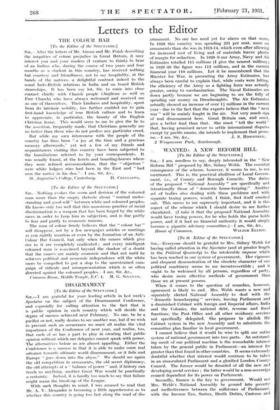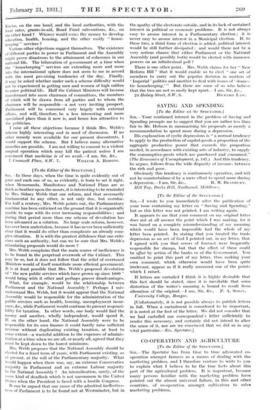[To th Editor of the SPECTATOR.]
Stn,—Every one should be grateful to Mrs. Sidney Webb for having called attention in the Spectator (and at greater length in the Political quarterly) to the intolerable impasse which has been reached in our system of government. Her vigorous and eloquent demonstration of the obsolete character of our political machinery seems to me incontrovertible ; and it ought to be welcomed by all persons, regardless of party, who desire more effective methods of government than those we at present possess.
When it comes to the question of remedies, however, agreement is likely to end. Mrs. Webb wants a new and separately elected National Assembly to deal with the " domestic housekeeping " services, leaving Parliament and a diminished Cabinet with foreign and Imperial affairs, India and the Colonies, the national debt, revenue and fiscal functions, the Post Office and all other residuary services not specifically delegated. She proposes to abolish the Cabinet system in the new Assembly and to substitute the committee plan familiar in local government.
I cannot believe that it would be wise to split our entire system of national government into two parts. An outstand- ing merit of our political machine is the remarkable interest taken by the general public in Parliament—an interest far greater than that found in other countries. It seems extremely doubtful whether that interest would continue to be taken in an emasculated Parliament and a glorified London County Council. The former would be denuded of all the new and developing social services ; the latter would be a non-sovereign council dependent for its power on Parliament.
Secondly, finance is the key to government. Would not Mrs. Webb's National Assembly be ground into poverty and ineffectiveness between the millstones of Parliament. with the Income Tax, Surtax, Death Duties, Customs and Excise, on the one hand, and the local .authorities, with the local rates, grants-in-aid, Road Fund subventions, &c., on the other hand ? Whence would come the money to develop education, health, housing, and the other costly " house- keeping " services ? Various other objections suggest themselves. The existence of different parties in power in Parliament and the. Assembly might prove disastrous to the attainment of coherence in our national life. The bifurcation of government at a time when the housekeeping" services are extending more and more into the international sphere does not seem to me in accord with the most promising tendencies of the day. Finally, it may be asked whether under such a scheme difficulty would not be experienced in getting men and women of high calibre to enter political life. Half the Cabinet Ministers will become transformed into mere chairmen of committees, the members of which will be drawn from all parties and to whom the chairmen will be responsible—a not very inviting prospect. Parliament will be concerned very largely with external affairs, and will, therefore, be a less interesting and more specialized place than it now is, and hence less attractive to the politician.
I raise all these objections because I think Mrs. Webb's scheme highly interesting and in need of discussion. If no other remedy were available for our present discontents, I would support the scheme. But I believe many alternative remedies are possible. I am not willing to consent to a violent surgical operation which may kill the patient unless I am convinced that medicine is of no avail. —I am, Sir, &c.,












































 Previous page
Previous page